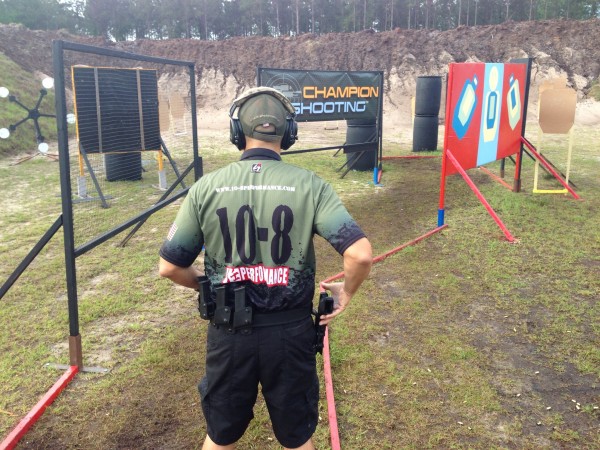Competition vs. the Tactical World: Stage Planning and Wrap Up
So as we head into the final stretch of our exploration on why competition is good (no great) for the tactical world, we have one more area to cover. I’d like to talk about stage planning and visualization.
There are several ways of stage planning so for most of this article I want to focus on USPSA style of stage planning. “Well, what is stage planning?” Good question. In USPSA, at a match, the rules allow competitors up to five minutes to look over a stage, walk through it and air gun (not air guitar) as they walk through. Let’s break down those parts.
As you look over the stage, you are finding all the targets, no shoots (innocents) and places where props activate more targets. When you walk through it, you begin to lay down the subconscious routines so it’s important to visualize your sights hitting the target exactly as if you were shooting. The air gun further enhances this experience to make it more “real” for the subconscious. Ideally, the competitor shooting the stage should let the subconscious take over allowing the conscious mind to find the sights and give a good trigger pull (see previous article).
Okay, now ask me…”how does this help in the tactical world?” Funny you should ask. There are a couple of things going on. First, it’s mental training of the subconscious to work techniques without conscious (ego) interference. It also helps in problem solving. When something pre-programed during the walk through gets screwed up (like make up shots forcing premature reloads or even gun malfunctions) it’s how the individual works through it that counts. Do they rush through, spraying and praying the rest of the stage? Do they freak out, panic and give up? I’ve seen both at real matches. I’ve also seen similar occurrences in the real world.
I’ve been witness to other officers having a compete mental breakdown when a chaotic scene becomes violent. I call it total vapor lock. The officer tries to withdraw from the scene and “hopes” someone else will finish what needs to be done. I’ve also seen other officers in the red zone of a “live” training drill make serious mistakes that would be easy fixes if only the officer could relax and work the problem. Critical incidents and extensive scenario based training don’t happen a lot so it makes sense to place oneself in an environment that forces problem solving. Competition is more than stress inoculation. It’s refining the mind to slow down and work the problem while the body is busy doing something else.
Have you ever pre-planned a search warrant or raid? Did you use your intel to figure out where the bad guys were and how many innocents (no shoots) were in the house? Did you practice a walk through of the same warehouse you were about to hit until you got it right? Hmmm, that sounds vaguely familiar. I fully believe there is a tactical application of the competitive shooting sports.
While we are on topic of the mental game, let’s talk about visualization. Before the timer goes off on what ever stage I’m about to shoot, I’ve shot it (in my head) at least ten times. I see myself hitting every target in the A zone, shooting on the move, performing fast reloads and completing the stage. The more I do it (visualizing) the better I get at it. I also apply the same device to my LEO world. Do you sit at the stop light, imagining what would happen if a bad guy pulled a gun and tried to carjack you? Or what about walking into a robbery at the bank? I know I do. I always taught my trainees to visualize what you’re going to find when you arrive on the domestic in progress. What the scene is going to look like. I also had them imagine that when they enter the room on a building search to “expect” to see a bad guy with a gun in the hard corner. Why? Because the mind doesn’t identify if what you are visualizing is real or not. It just sees it like it’s actually happening. That’s why movies are so effective. That’s why top professional athletes spend countless hours visualizing the ball going through the basket, the puck hitting the net or the golf ball nailing the hole in one.
Visualization is an important skill set that belongs in your tactical briefcase. Develop the skill at your next match.
I want to wrap up these four articles briefly. We started this journey talking about shooting competition as a way to inoculate your stress. How it helps with gun handling (like a boss) and shooting better with trigger control. I see a world where the tactical community embraces the “gamers” and sing a song while nailing the A zone at speed. Shooting competition has helped me become a better shooter and really at the end of the day, isn’t that all it really is? Shooting is shooting. Whether it’s in a dark alley in the worst part of town or in the shooting bay of a world class facility.
I extend an open invitation to my tactical friends that I know and those who I’ve haven’t met (yet). Come shoot a match with me and let’s see where it takes you?
Be safe (and win…)




Arik, great work. It has been an enjoyable article with very good arguments. I started shooting USPSA and 3 Gun last year, and haven’t regretted one moment. My shooting and mindset have improved immensely. Qualifications, training, and street performance have never been better. It has also been a good source of stress release (if that makes sense) and outreach. Keep up the good work.
Way to go Kirk! Hope to see you at a match one day…